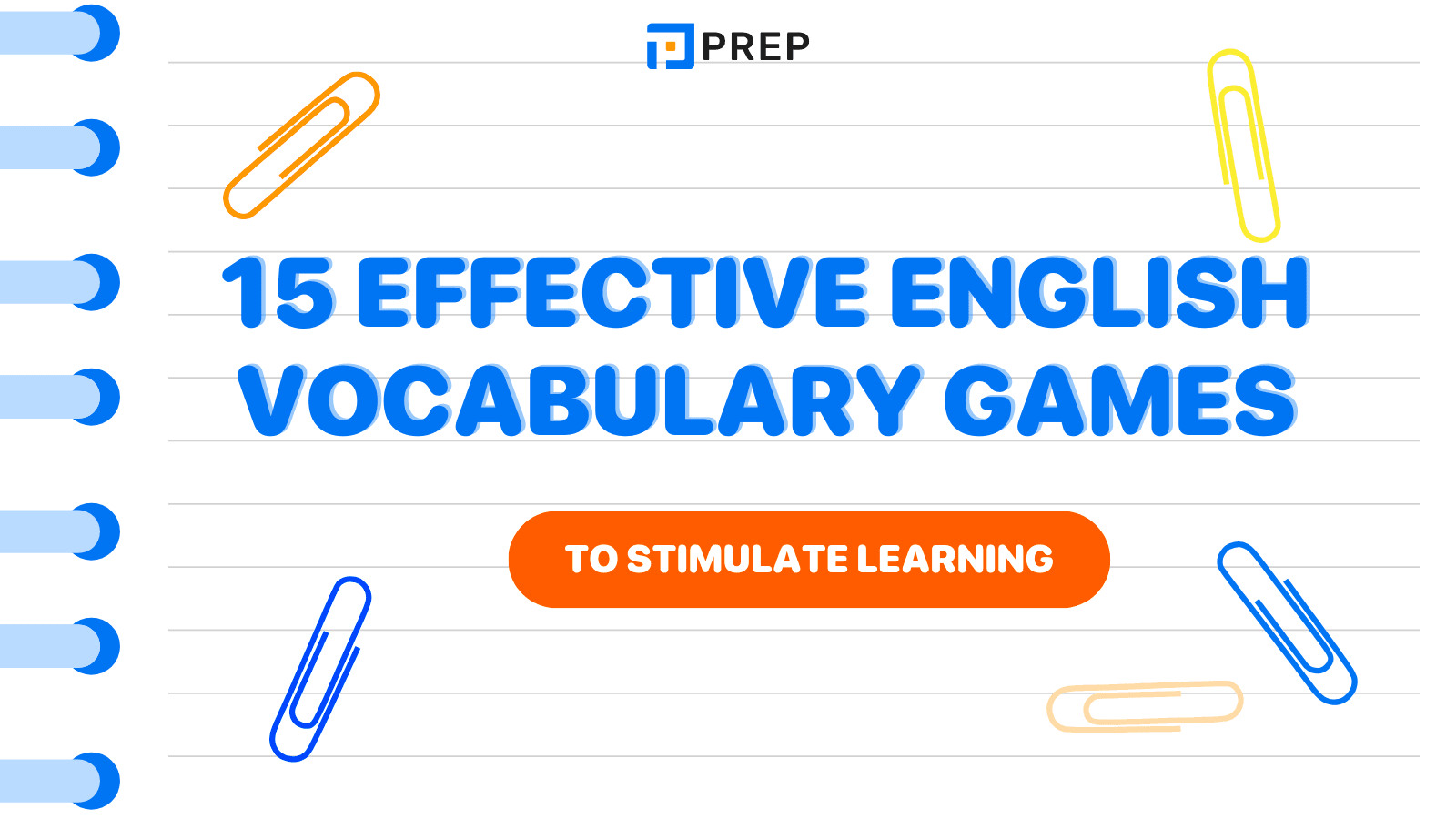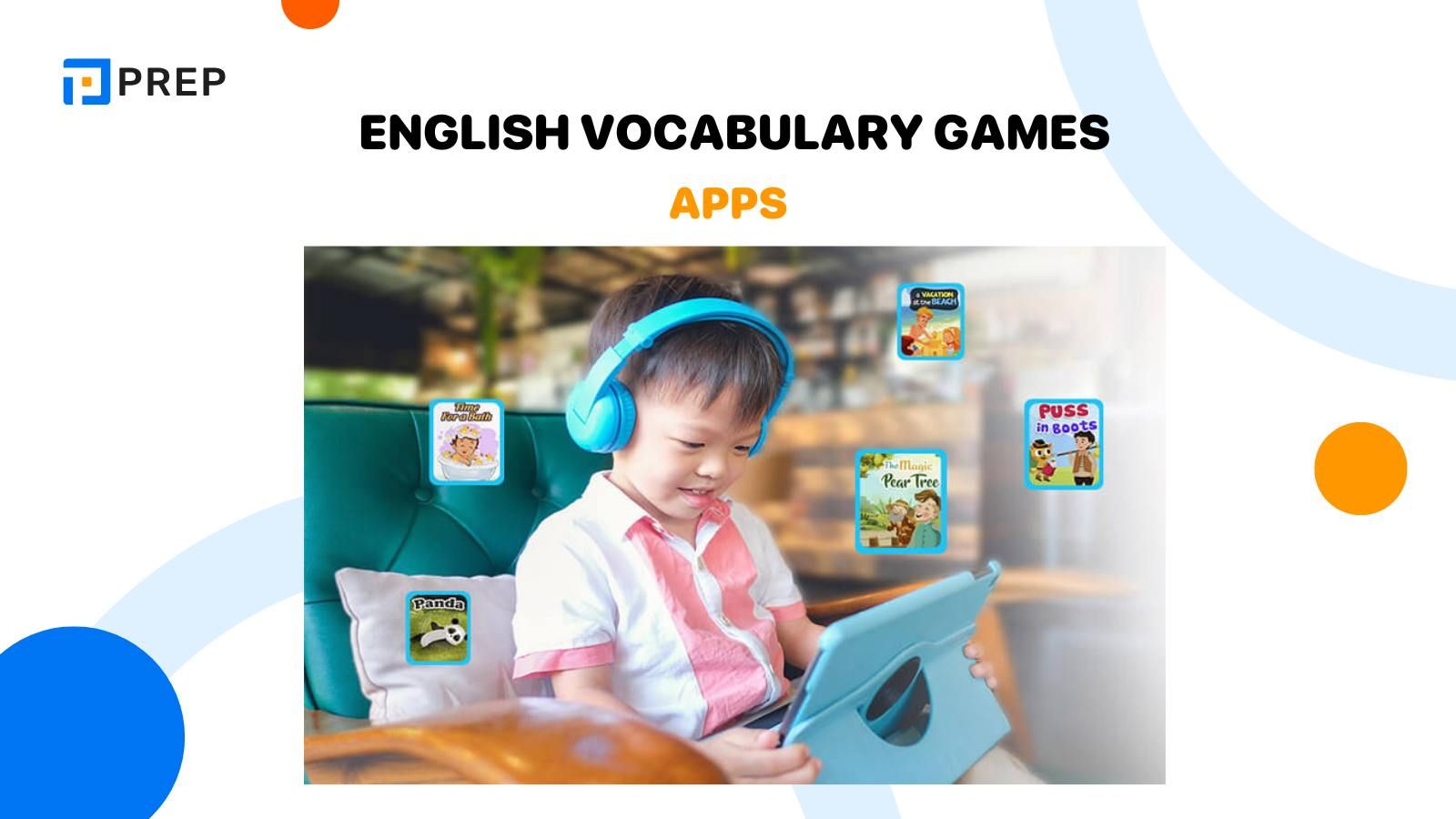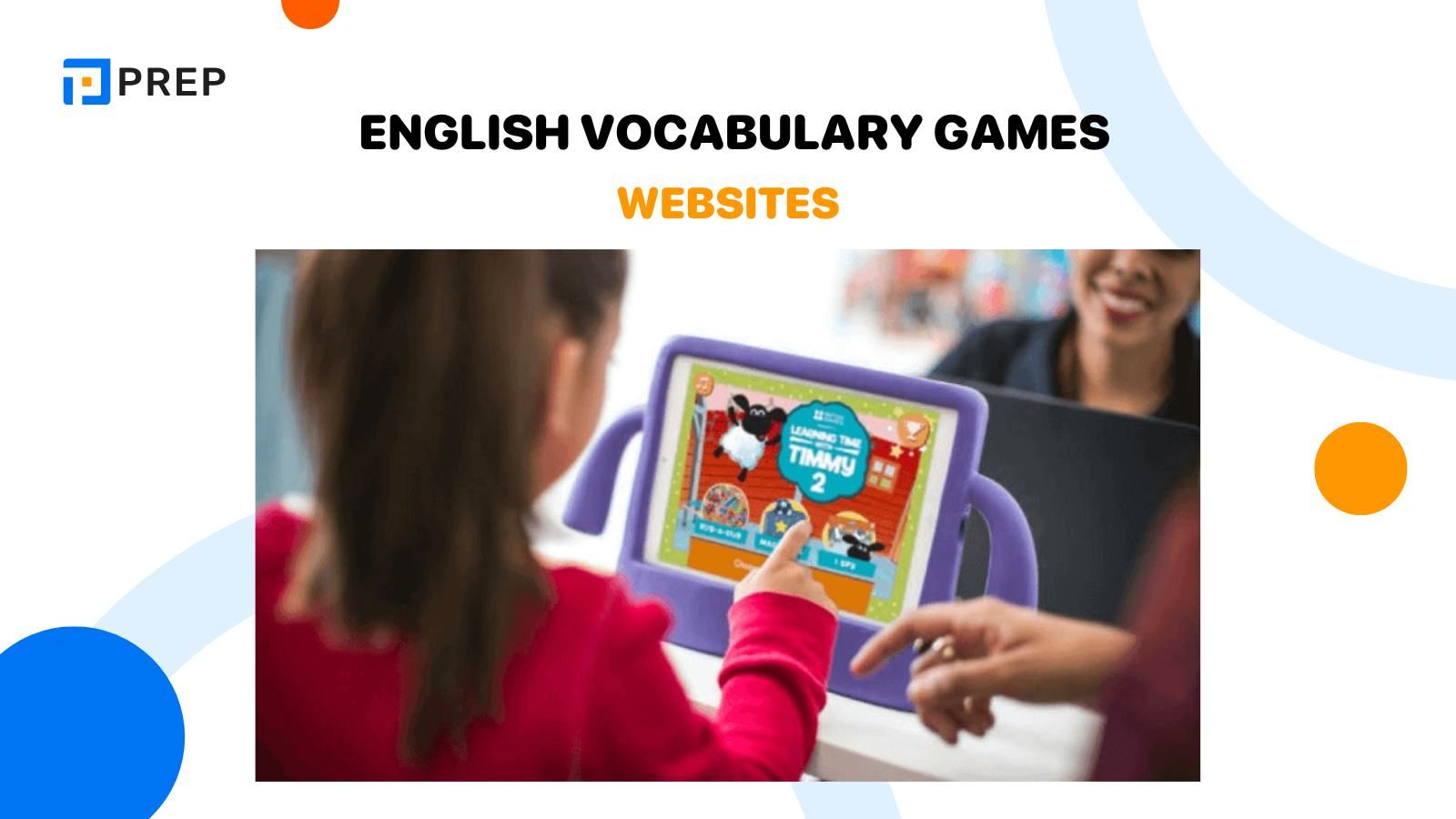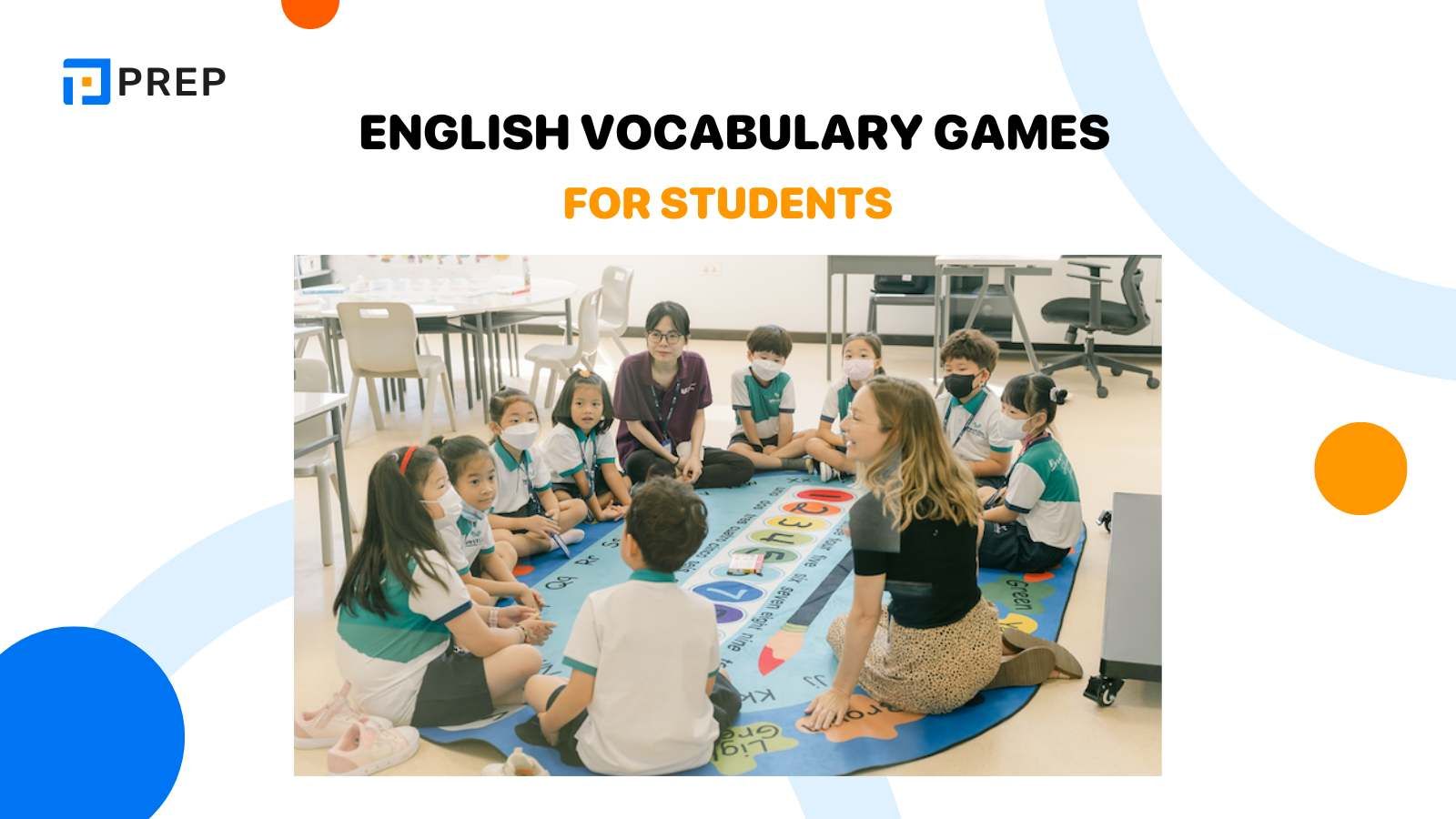15 effective English vocabulary games to stimulate learning
How can you learn vocabulary through games, and how should you practice to achieve high effectiveness? In this article, PREP will provide you with a complete list of English vocabulary games that will excite your learning, and share useful practicing methods! Take a look now!

I. Why should you learn through English vocab games?
Learning vocabulary through games offers significant benefits. This is because games are designed to create interest and motivation in the learning process through engaging interactive activities. As a result, you feel excited and naturally want to explore new vocabulary.
Furthermore, participating in the game activities helps you learn how to apply the vocabulary in practice, making it easy to remember the meanings and usage of the words in a short time. Additionally, games create an excellent environment for learning together with friends, providing opportunities to actively exchange and reinforce knowledge with each other.
Therefore, learning English vocabulary through games not only makes the learning process enjoyable but also helps you master the usage of the vocabulary. This is an effective method to quickly improve your English language proficiency.
II. Reputable online English vocabulary games for increasing vocabulary
1. Apps to better vocabulary

1.1. Vocabulary.com
Vocabulary.com is a vocabulary building game that uses questions, games, and quizzes to help users effectively master vocabulary. The app focuses on learning vocabulary through the application of words in various contexts.
Vocabulary.com has over 15,000 vocabulary words across various topics. By recognizing your answers, Vocabulary.com will automatically personalize the learning experience to suit your needs and select the most relevant vocabulary topics.
Advantages:
-
User-friendly and easy-to-use interface
-
Provide personalized lessons based on your level and tracks your learning progress
-
Lessons are designed intelligently from easy to difficult, with continuous interactive question-and-answer sessions to ensure vocabulary learning is engaging
Disadvantages:
-
Some extended features and learning materials require a paid subscription to access the full functionality of the app.
Download links:
-
IOS (updating)
1.2. Vocabulary Builder
Vocabulary Builder is an app that provides games to improve vocabulary, used by over 5 million students to improve their vocabulary. This English vocabulary game app offers 1,200 of the most common words, divided into different categories. You can practice vocabulary through fill-in-the-blank games, matching games, and word association games.
Each vocabulary word in the app has audio pronunciations, definitions, and example sentences. The vocabulary games are divided into three levels: beginner, intermediate, and advanced. You can test your knowledge through quizzes and progress through the game levels to unlock new words.
Advantages:
-
Vocabulary Builder has a user-friendly and intuitive interface.
-
Include progress tracking features through the games, which helps you effectively practice vocabulary
-
Also provide vocabulary tests for exams like the SAT and TOEFL
Disadvantages:
-
The graphics are not as visually engaging or colorful compared to some other English vocabulary game apps.
Download links:
1.3. WordUp
The WordUp app provides unique games to expand vocabulary with a Vocabulary Builder feature that uses advanced algorithms to automatically suggest new words each day based on the user's current knowledge, helping you gradually improve your language skills. This app combines fun word puzzle games with vocabulary learning, where you have to match vocabulary words with the corresponding images within a time limit.
With over 4,000 English words and 800 images, you can set different gameplay modes, including single-player, multiplayer, and online play with other users. Additionally, this English vocabulary game app has a "Knowledge Map" feature that integrates daily vocabulary into your learning process and tracks your progress, allowing you to continuously and systematically expand your vocabulary.
Advantages:
-
Visually appealing and intuitive interface
-
Variety of gameplay modes to choose from
Disadvantages:
-
Some advanced features may require a paid subscription
-
Occasional issues with images not matching the vocabulary words provided
Download links:
1.4. Memrise
Memrise is extremely popular among English vocabulary games, with over 70 million learners worldwide, due to its method of learning through repetitive vocabulary games. With Memrise, you can choose from hundreds of different real-life scenarios to play vocabulary games, such as greetings, vacation activities, introducing hobbies, ordering at a restaurant, job interviews, and more.
The app also provides lessons on common phrases and idioms used by native speakers. You can also practice listening to vocabulary through native speaker videos and practice conversing using the AI language assistant.
Advantages:
-
User-friendly and easy to use interface
-
Ability to save vocabulary to learn offline anytime, anywhere
-
Engaging flashcard-based learning mode
Disadvantages:
-
Some content in Memrise is user-generated, so the quality may not be consistent
-
The Memrise Pro version requires a paid subscription to access advanced features
Download links:
1.5. Quizlet
Quizlet is among games for increasing vocabulary that allows users to create and share their own vocabulary sets. It provides question-answering games and flashcards to help users learn vocabulary quickly and effectively. The app has a large community of over 300 million users, where you can search for helpful vocabulary sets already created by other users.
With the Quizlet app, students and teachers can also upload class notes and discussion questions through the "Magic Notes" feature. They can then turn vocabulary sets into engaging flashcard games. After each week, you can take advantage of the "Learn and Test" mode to turn the flashcards into an effective short quiz to review new vocabulary.
Advantages:
-
Users can flexibly create flashcards, games, or vocabulary quizzes
-
Provide offline learning features, allowing you to study anytime, anywhere
Disadvantages:
-
Some advanced features like recording and classifying vocabulary are only available in the paid version of the app.
Download links:
2. English vocabulary games online in websites

2.1. Freerice.com
Freerice.com is a charitable website that combines English vocabulary games. For each vocabulary question you answer correctly, Freerice will donate 10 grains of rice to the United Nations World Food Programme. This means that when you play the vocabulary game on Freerice, you not only improve your language skills, but also contribute to helping those in need around the world.
On the website, you can choose different English vocabulary topics and difficulty levels through quizzes, synonyms, and antonyms. Each question will display four options, and you need to select the correct answer to accumulate points that convert to donated rice.
Advantages:
-
Not only help you build your English vocabulary, but also contributes to charity.
-
Provide a variety of topics to choose from and automatically increases difficulty based on the player's level.
Disadvantages:
-
Limited to only a multiple-choice quiz format, lacking diversity in game types.
-
Lack many challenges or rewards to motivate players.
Website: https://play.freerice.com/
2.2. Wordgames.com
The English vocabulary game website Wordgames.com provides you with fun competitions that help improve your vocabulary knowledge in an entertaining way. You can find various types of games on Wordgames.com, such as typing competitions, crossword puzzles, or word searches. These games will challenge your patience and vocabulary retention.
In addition, the website also offers brain-teasing and skill-building games, such as going on interesting adventures to find missing vocabulary words. Importantly, Wordgames.com ensures the game content is safe, healthy for children, and suitable for all ages.
Advantages:
-
All the English vocabulary games are free to play.
-
Diverse game formats provide users with many options for learning and entertainment.
-
Ensure the games are designed to be wholesome and safe for children.
Disadvantages:
-
The website displays advertisements during gameplay, which can sometimes be disruptive for users.
-
Occasional slow processing of game features can cause the screen to freeze or lag.
Website: https://www.wordgames.com/
2.3. Turtle Diary
The English vocabulary game website Turtle Diary is a useful resource for developing children's language skills through a variety of games related to grammar and vocabulary. These games help children improve their speaking, listening, reading, and writing abilities when using basic words and grammar. Each game tests different vocabulary areas such as Word Families, Spelling, and Sight Words.
The English vocabulary games on Turtle Diary provide visual and audio support to help children easily understand and remember vocabulary. In addition, the website also offers videos, quizzes, lessons, and exercises for children to comprehensively learn English.
Advantages:
-
Diverse and rich selection of vocabulary game topics such as adjectives, verbs, sentences, spelling, etc.
-
Games are designed with engaging interactive activities, with visual and audio support to help children learn enthusiastically and easily.
-
Provides detailed and easy-to-understand instructions on how to play the games, helping children confidently learn and play independently.
Disadvantages:
-
There are many advertisements displayed that can distract children during their learning.
-
Some games require a paid account to access all features.
Website: https://www.turtlediary.com/games/language-arts.html
2.4. LearnEnglish Kids
LearnEnglish Kids is an extremely reputable English vocabulary game website from the British Council. The "Word games" section of this website provides a wide variety of topics, allowing you to learn new vocabulary while practicing language skills creatively and engagingly.
The English vocabulary games cover familiar everyday topics like animals, fruits, colors, jobs, sports, locations, etc. to help young learners remember vocabulary easily. The interactive game activities include matching words, finding missing words, arranging vocabulary by topic, and connecting letters.
In addition to the English vocabulary games, the LearnEnglish Kids website also provides other learning materials such as songs, short stories, poems, videos, and flashcards. Furthermore, you can also interact with other players to create a learning community and share ideas and experiences.
Advantages:
-
Engaging vocabulary games: The website offers a diverse and captivating selection of vocabulary games that help English learners practice vocabulary skills in an interactive way.
-
Variety of different topics to help learners expand their vocabulary across many fields.
-
Allows learners to directly interact through activities like word matching and connecting to effectively consolidate and remember vocabulary.
-
Provides opportunities for users to exchange ideas, experiences, and learn from other English learners.
Limitations:
-
Although the website offers many topics and vocabulary games, the number of vocabulary words in each topic may be limited. Therefore, learners need to find additional resources to further expand their vocabulary.
-
Lacks assessment features or user feedback to contribute to improving the games.
Website: https://learnenglishkids.britishcouncil.org/
2.5. CrazyGames
CrazyGames is a wonderful source of English vocabulary games. The CrazyGames website has a dedicated section for vocabulary practice, including games like Words of Wonders, Daily Word Search, Word Wipe, Kitty Scramble... These games vary in gameplay, from finding words in a letter grid, to arranging words, to unscrambling letters.
The vocabulary games on the website are designed to make vocabulary learning fun and engaging. Players can practice their vocabulary skills in a creative way while enjoying the gaming experience. The CrazyGames website provides vocabulary games that are compatible with both computer and mobile device configurations, so you can play online on any web browser at any time.
Advantages:
-
Diverse vocabulary games with eye-catching, enjoyable graphics, allowing players to comfortably choose from a variety of options.
-
Convenient configuration and easy access on both mobile and computer.
-
Accumulate points after each win in the English vocabulary games, which motivates and encourages the learner.
Disadvantages:
-
The English vocabulary game website displays many advertisements, which can be annoying and disruptive to the player's experience.
-
There is no rating or feedback feature for users to contribute towards improving the games.
Website: https://www.crazygames.com/t/word
III. English word games for students

To liven up the classroom atmosphere, teachers can also conduct some direct in-class English vocabulary games to expand vocabulary and create interest in learning a foreign language for students, such as:
1. Word Jumble Race
Word Jumble Race is one of the English vocabulary games that requires players to rearrange the order of vocabulary words in a sentence to be as accurate as possible. This game not only helps students develop critical thinking skills and teamwork, but also enhances their grammar and vocabulary knowledge.
Word Jumble Race is suitable for groups of students who have learned how to use vocabulary to write a complete English sentence.
The game is carried out as follows:
-
Step 1: Divide the class into 4-6 groups.
-
Step 2: The teacher divides the board into multiple sections and writes 3-5 English sentences with the word order jumbled.
-
Step 3: The groups rearrange the vocabulary words to create complete, grammatically correct sentences. The group that finishes first will be the winner.
2. Hot Seat
Hot Seat is one of the most popular English vocabulary games among students. The game helps students expand their vocabulary, practice their English listening and speaking skills, and effectively encourages competition in the classroom.
The game is carried out as follows:
-
Step 1: Divide the class into 2-4 teams. Select one person from each team to sit in the "Hot Seat", facing the class with their back to the board.
-
Step 2: The teacher writes a vocabulary word on the board. The remaining members of each team take turns standing up and describing the vocabulary word to help the person in the "Hot Seat" guess it. Students are only allowed a limited time to describe the word without saying, spelling, or drawing it.
-
Step 3: The team that successfully guesses the most vocabulary words in the shortest amount of time will be the winner.
3. Call My Bluff
The next in the list of common English vocabulary games is called Call My Bluff. This is a fun and lively activity with the purpose of learning information about the students in the class, such as their names and hobbies. At the same time, the teacher will get an understanding of the students' vocabulary usage and English communication abilities. The most suitable time to apply this game is at the beginning of the term, when the teacher needs to get to know and connect with the students.
The game is carried out as follows:
-
Step 1: Each student writes three sentences about themselves, with two of them being lies and one being the truth.
-
Step 2: The teacher pairs up two students to play the game. The students will ask each other questions about each sentence and then guess which one is the truth.
-
Step 3: The teacher observes each pair of students to assess the English abilities of each student. The teacher can also participate in the game at the same time to get to know the students in the class.
-
Step 4: The teacher changes the student pairs to continue the game, and the teacher also writes some truths about themselves to participate in the game and get to know the students in the class.
4. Board Race
Board Race is among English vocabulary games that aims to create an energetic atmosphere and assess students' prior knowledge, so you should organize this game at the beginning of the lesson.
The game is carried out as follows:
-
Step 1: Divide the class into 4 teams and provide each team with a different colored pen. Divide the board into 4 sections, each for one team, and assign a vocabulary topic for each team.
-
Step 2: Require each team member to take turns going up to the board and writing vocabulary words related to their team's topic. Each correct vocabulary word is worth 1 point.
-
Step 3: After 15 minutes, summarize and see which team has written the most correct vocabulary words related to their topic, and they will be the winner.
5. Pictionary
Pictionary is one of the English vocabulary games suitable for all ages and levels. This fun game will encourage students to be creative and increase effective interaction in the classroom. At the same time, students will actively remember the vocabulary they have learned in class.
The game is carried out as follows:
-
Step 1: Before starting the class, the teacher prepares vocabulary cards and places them on the table. Then divide the class into 4 teams.
-
Step 2: The teacher gives a marker to a member of each team and asks the students to choose a vocabulary card that has been prepared.
-
Step 3: The student will illustrate the vocabulary word by drawing a picture on the board for the remaining team members to guess.
-
Step 4: The team that correctly guesses the first vocabulary word will score a point. The student who finished drawing will designate another member of their team to come up and continue illustrating for their team, repeating this process until all the words are used up.
-
Step 5: Summarize the points from the teams to determine the winning team.
III. Effective Methods for Learning English Vocabulary
How can you effectively review and practice English vocabulary? Let's explore the following methods with PREP!
1. Word Web
The Word Web method is very easy to implement. You just need to write the vocabulary topic in large letters in the middle of the page, and then draw branches and write the vocabulary words along those lines. After adding all the vocabulary words to the page, a web-like structure will be formed, which is why it's called a Word Web. Consolidating the vocabulary you've learned through a Word Web is an extremely useful method.
Specific example of implementation:
-
Step 1: Choose a topic or vocabulary to learn. For example, let's choose the topic "Animals".
-
Step 2: Write the word "Animals" in the middle of the page.
-
Step 3: Draw branches from the central "Animals" and write the related vocabulary fields into those branches. For example, the first branch could be "Mammals", the second branch "Birds", and the next one could be "Reptiles". Continue drawing and writing branches for the other animal types.
-
Step 4: Write the specific vocabulary words along the corresponding branches. For example, under the "Mammals" branch, you might have words like "Dog", "Cat", "Elephant", etc.
-
Step 5: Continue adding branches and vocabulary words for the other animal species until you have written all the vocabulary related to the "Animals" topic.
2. Word Station
This is an advanced vocabulary learning method compared to Word Web. When you have many small vocabulary groups under a larger topic, you can divide them into "stations" to store the specific vocabulary inside. Listing the words you've learned through the Word Station method can help you remember them effectively for a long time.
Here's a detailed example:
-
Step 1: Choose the topic or vocabulary you want to learn, for example "Food".
-
Step 2: Draw small square or rectangular boxes on a page, with each box representing a "station".
-
Step 3: Label each station with the specific vocabulary group. For example, one station could be "Fruits", another "Vegetables" or "Meat".
-
Step 4: Write the specific vocabulary words into each corresponding station. For example, in the "Fruits" station, you could have "Apple", "Banana", "Orange", etc.
-
Step 5: Continue adding stations and vocabulary for the other groups until you have covered all the vocabulary related to the "Food" topic.
3. Word Collector
Creating a Word Collector will help you expand the different types of words - Nouns, Verbs, Adjectives, Adverbs - for a word you've learned, or even find Synonyms and Antonyms. Therefore, reviewing vocabulary using the Word Collector method will help you systematically organize your vocabulary sets in a structured way.
For example, here is a specific Word Collector for the word "Happy":
|
Happy (adj) |
||||
|
Happiness (n) |
Make (v) happy |
Happily (adv) |
Glad (synonym) |
Sad (antonym) |
The article on PREP has summarized all the useful English vocabulary games that can stimulate effective learning. At the same time, PREP has also guided you through 3 highly effective vocabulary review methods. Be sure to save this information to help you study and prepare for exams successfully!

Hi I'm Chloe, and I am currently serving as an Product Content Administrator at Prep Education. With over five years of experience in independent online IELTS study and exam preparation, I am confident in my ability to support learners in achieving their highest possible scores.
Comment
Premium content
View allPersonalized roadmap
Most read












